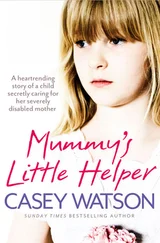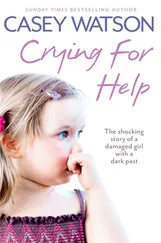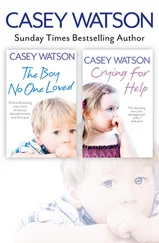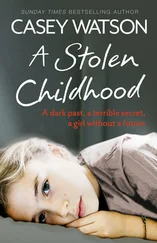
This book is a work of non-fiction based on the author’s experiences. In order to protect privacy, names, identifying characteristics, dialogue and details have been changed or reconstructed.
HarperElement
An imprint of HarperCollins Publishers
1 London Bridge Street
London SE1 9GF
www.harpercollins.co.uk
First published by HarperElement 2016
FIRST EDITION
© Casey Watson 2016
A catalogue record of this book is available from the British Library
Cover image © Yolande de Kort/Arcangel Images (posed by model)
Cover layout © HarperCollins Publishers 2016
Casey Watson asserts the moral right to be identified as the author of this work
All rights reserved under International and Pan-American Copyright Conventions. By payment of the required fees, you have been granted the nonexclusive, non-transferable right to access and read the text of this e-book on screen. No part of this text may be reproduced, transmitted, downloaded, decompiled, reverse engineered, or stored in or introduced into any information storage retrieval system, in any form or by any means, whether electronic or mechanical, now known or hereinafter invented, without the express written permission of HarperCollins e-books.
Find out about HarperCollins and the environment at
www.harpercollins.co.uk/green
Source ISBN: 9780008142582
Ebook Edition © October 2016 ISBN: 9780008142599
Version: 2016-12-19
Cover
Title Page
Copyright
Dedication
Acknowledgements
Preface
Chapter 1
Chapter 2
Chapter 3
Chapter 4
Chapter 5
Chapter 6
Chapter 7
Chapter 8
Chapter 9
Chapter 10
Chapter 11
Chapter 12
Chapter 13
Chapter 14
Chapter 15
Chapter 16
Chapter 17
Chapter 18
Chapter 19
Chapter 20
Chapter 21
Epilogue
Topics for Reading Group Discussion
Moved by Runaway Girl ?
Casey Watson
Moving Memoirs eNewsletter
About the Publisher
I’d like to dedicate this book to all those working in the care system in one form or another, for their dedication, hard work, and constant pushing for change and improved services for our young people. Despite budget cuts, government changes and constantly having to adapt to an increasing workload, you still strive for that light at the end of the tunnel. As a result, someone else in the care system will thrive, someone else will have a fair shot at a good life. I feel so proud to be able to be part of this, and if you, the reader, are thinking about joining the ranks of social care in some form, just go ahead and do it. The rewards far outweigh the difficulties we face.
As always, I’d like to thank my wonderful, dedicated team at HarperCollins. They have championed me from the start and continue to do so despite difficult times. My very patient agent, Andrew Lownie, deserves a medal for what he does, and it goes without saying how much I appreciate all he has done and continues to do. Thank you so much, Andrew. And as always, special thanks to my wonderful friend and mentor, Lynne. You know what an inspiration you are!
Around 3,000 children arrive in the UK alone every year seeking asylum, and unfortunately an estimated 5,000 young people – almost all of them girls – have been trafficked here since the late nineties. Our government then struggles to navigate ‘complex and adult systems’ (i.e. those designed for adults, as no one imagined children would migrate alone) to get them the support they need. They are sometimes known as ‘hidden children’.
January
There is a grandparenting moment – and it’s one of the best ones – when, after a great deal of patience and fortitude, not to mention finger-crossing, you realise that you have finally got the baby off to sleep. And, though you love them (and with an intensity that can take your breath away), you are mighty glad that you can do the proverbial, and give them back to your offspring again.
It was into one such moment that my mobile exploded into life. My mobile that I’d forgotten I still had on me.
‘Bloody hell, Case!’ hissed Mike as I scrabbled to try to silence it. Which was a case of frantically slapping both hands over the offending cardigan pocket to muffle it, and beating a hasty retreat, backwards, from Dee Dee’s bedroom.
And by some miracle, despite the shocking cacophony, she didn’t stir. I missed the call, though, having clattered down the stairs before attempting to answer it, and gone back into the living room. And shut the door, for good measure.
I finally pulled the phone out, long after it had ceased warbling at me, while Mike relocated the baby monitor to the coffee table, glaring at it as if willing it to remain silent. It had been a long, fraught hour getting the baby off, to be fair.
‘Oh,’ I said, ‘it’s John. As in Fulshaw. Wonder what he wants.’
Mike flumped down on the sofa beside me. ‘Well, if it’s “Would you mind taking in another ten-month-old baby?”, that’ll be a no.’
‘Oh, hush,’ I said. ‘Go and make some coffee and stop moaning. She’s down now, and she’ll stay down. You know what she’s like.’
‘I’m not surprised,’ said Mike, with feeling. ‘What is it about flipping babies? I’ve never really got that. When you’re tired you go to sleep. Problem solved. Easy. Why do they have to make it so difficult ?’
I grinned at him, already pressing the return-call button on my mobile. As a veteran of two kids, four grandkids, and the various little ones we’d fostered, he knew that was one of the great unanswered questions precisely because there would never be an answer to it. An overtired baby was a simple but complicated beast; she was overtired, but the reasons could be myriad, from colic, to teething, to being too hot, cold or stimulated – it could even be the smell of my new perfume. But we’d got there and could relax now … well, after a fashion. And possibly not for long, given the call.
‘Hi there, John,’ I said moments later. ‘So. To what do we owe the pleasure?’
‘Oh, dear,’ he said. ‘I’m sorry to be calling you so late.’
‘It’s only eight, John. It’s fine,’ I reassured him. Though, while doing so, I was already taking stock of why he’d be calling. It was outside of office hours, so nothing routine or training-related, clearly. Which presumably meant a child he wanted us to take in.
Mike had picked up our coffee mugs but still lingered in the living room, obviously thinking the same thing.
‘We’ve got a teenager on the way,’ John explained, and I mouthed the word to Mike, who nodded. ‘Coming to us via a rather circuitous route. Not from round here – well, to be precise, not from anywhere remotely round here. She’s a Polish girl, apparently – not been long in the country, and all out of options.’
‘What’s happened to her?’ I asked John as Mike headed to the kitchen.
‘We’re not entirely clear yet. She doesn’t speak a lot of English and the details are sketchy. Very sketchy. So, to be truthful, I have no idea what we’re dealing with yet.’
John not having any idea what we’d be dealing with was the case more often than not, so this, in itself, didn’t faze me. Nor did what he did know – that she was 14, and had turned up at a social services building earlier, very distraught, in Hull, some 100 miles away. And, with no room at the inn via the local out-of-hours service, the ‘problem’ had eventually made its way to our fostering agency, and, as John was the supervising social worker and manager of our local office, to us.
Читать дальше













